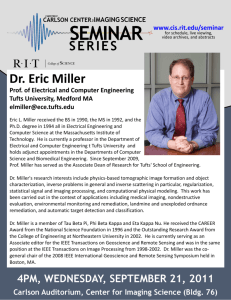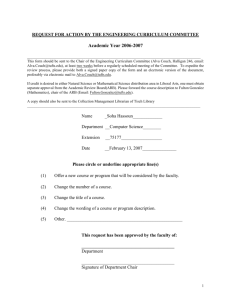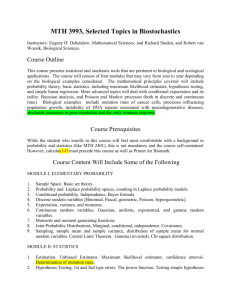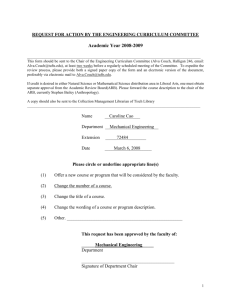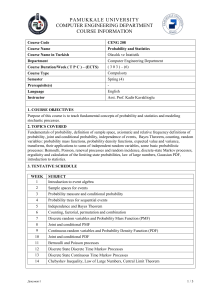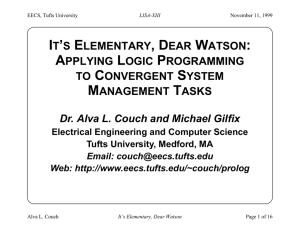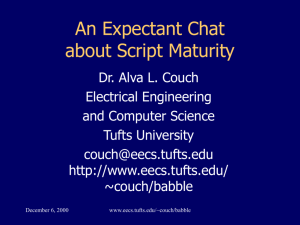MSWord - Tufts University
advertisement
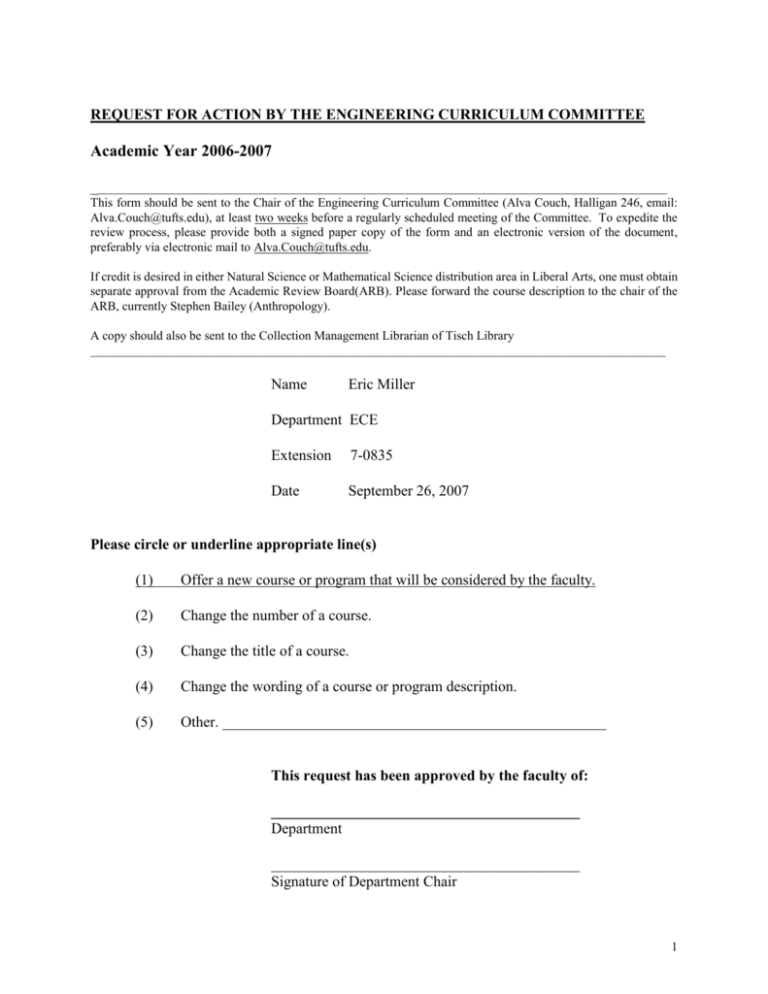
REQUEST FOR ACTION BY THE ENGINEERING CURRICULUM COMMITTEE Academic Year 2006-2007 ___________________________________________________________________________________________ This form should be sent to the Chair of the Engineering Curriculum Committee (Alva Couch, Halligan 246, email: Alva.Couch@tufts.edu), at least two weeks before a regularly scheduled meeting of the Committee. To expedite the review process, please provide both a signed paper copy of the form and an electronic version of the document, preferably via electronic mail to Alva.Couch@tufts.edu. If credit is desired in either Natural Science or Mathematical Science distribution area in Liberal Arts, one must obtain separate approval from the Academic Review Board(ARB). Please forward the course description to the chair of the ARB, currently Stephen Bailey (Anthropology). A copy should also be sent to the Collection Management Librarian of Tisch Library ___________________________________________________________________________________________ Name Eric Miller Department ECE Extension 7-0835 Date September 26, 2007 Please circle or underline appropriate line(s) (1) Offer a new course or program that will be considered by the faculty. (2) Change the number of a course. (3) Change the title of a course. (4) Change the wording of a course or program description. (5) Other. ___________________________________________________ This request has been approved by the faculty of: _________________________________________ Department _________________________________________ Signature of Department Chair 1 On this page or on attached pages, please describe changes, rationale, and resources required to implement the proposed changes. 1. New course or other requested changes. Please give department designation, course number, course title, and new Bulletin description. Note that the description should be about four printed lines and written in Bulletin language. For other requested changes, please give old designation, course number, course title, and old course description; follow this with a description of the requested changes. Attach additional pages if needed. EE-0104. Probabilistic Systems Analysis: Development of basic analytical tools for the modeling and analysis of random phenomena with application to problems across a range of engineering and applied science disciplines. Introductory probability theory, sample and event spaces, discrete and continuous random variables, conditional probability, expectations and conditional expectations, and derived distributions. Basic random processes including Bernoulli and Poisson. Statistical analysis methods including hypothesis testing, confidence intervals and nonparametric methods. Markov chains. 2. Please describe the rationale and impact of the proposed changes and/or for offering the new course or courses. Indicate ways in which proposed changes affect existing or proposed programs of study both within and outside your department. When appropriate, indicate relationships between changes and practices at peer institutions, as well as relevance to School of Engineering strategic plans. The goal of this class is to provide a mathematically rigorous presentation of modeling tools associated with random phenomena and probabilistic systems stressing the application of these basic methods to a range of problems in electrical and computer engineering, computer science, civil engineering, manufacturing and operations research. It is hoped and expected that this class will be attractive to both undergraduate as well as graduate students from across the School of Engineering. This class stands between Math 161/162 and ES 56. The math sequence covers probability the first semester and statistical methods the second. The proposal class will cover many of the same topics as Math 161 with the exception of limit theorems, which will be covered in less depth. In their place, we shall discuss basic methods in statistical analysis including sample mean and variance estimators and fundamental decision theory (significance testing and binary hypothesis tests) as well as Markov chains. Additionally, there will be a strong emphasis on the use of these methods to address problems in the application areas noted previously that are of specific interest to students in the School of Engineering. Relative to ES56, this class will emphasize less the use of statistical methods for the analysis of experimental data and provide greater coverage of a range of analytical tools and modeling methods that can be broadly applied in this area such as Bernoulli, Poisson and Markov processes. 2 Discussions between Prof. Miller and members of the CS department indicate enthusiasm for this approach to coverage of basic concepts in probability and statistics. Specifically, it is felt that this class will offer strong preparation for the advanced CS classes in Machine Learning and Pattern Recognition, topics that require facility with the type of analytical tools to be developed in this class. This class is modeled on the 6.041/6.431 http://web.mit.edu/6.041/www/home.html. course at MIT. See If approved, this class will be placed on the list of courses that can fulfill the Probability and Statistics requirement for the BSEE, BSCPE, and BSCS degrees in ECE and CS. 3. Please describe the resources required to implement the proposed changes, including plans for how these resources will be obtained. Include expected enrollments, class sizes, expected numbers of sections, and frequency of offering for each class. Describe modifications required in your department’s curriculum or instructor’s regular course offerings to make the proposed changes possible. Identify whether required funding for resources is pending and/or dependent upon external grants. Where possible, compare resource requirements to existing requirements before the proposed changes. One section of this class will be taught each fall by Prof. Eric Miller of Tufts’ ECE Department as one of his “regular” classes. No changes to Prof. Miller’s regular offerings or indeed the curriculum of the ECE department will be required since (due to his recent arrival at Tufts), Prof. Miller has not yet established a regular set of classes to teach. Expected enrollment will be between 20 ad 35 students each Fall. No additional resources are required. 4. In the case where resources are required, please attach a statement from the Dean of Engineering (or a designee) concerning the resources and how they will be provided. ________________________________________________________________________ Please fill out the attached Library Impact Study form if: (a) you are requesting that a new course be included in the curriculum or (b) you anticipate the need for substantial new library resources as a result of changes in the description of your course. ________________________________________________________________________ 3 TUFTS UNIVERSITY ARTS AND SCIENCES LIBRARY LIBRARY IMPACT STATEMENTFOR UNDERGRADUATE COURSES Please furnish the information requested below and return this form to: Collection Management Librarian, Arts and Sciences Library, Tisch. (The Arts and Sciences Librarian is an ex officio member of the Committee on Curricula.) 1. Department or Program: Electrical and Computer Engineering 2. Title of course: Probabilistic Systems Analysis 3. Suggested department course number: ECE 104 4. Course will first be offered: 5. Instructor(s): Fall 2008 Eric Miller _____________________________________________________ 6. Campus telephone number: 7-0835 7. Anticipated enrollment 25 8. Open to undergraduates Yes graduates Yes 9. This course is primarily dependent on: Text Library resources 10. X _______ Brief description of topics to be covered Introductory probability theory, sample and event spaces, discrete and continuous random variables, conditional probability, expectations and conditional expectations, and derived 4 distributions. Basic random processes including Bernoulli, Poisson, and Markov. Statistical analysis methods including hypothesis testing, confidence intervals and nonparametric methods. 11. Description of any additional library resources needed to support this course. None 5
